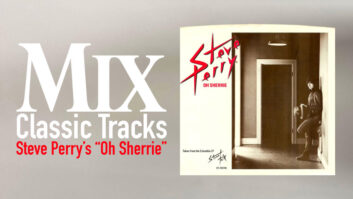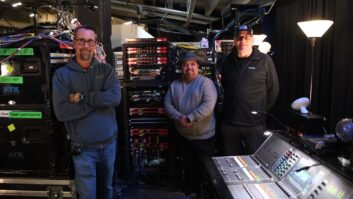For producers, engineers, musicians and songwriters, proper crediting is the lifeblood of a creative career. It’s how the world knows what you’ve done, and it can mean the difference between a ringing phone and a silent one. Correct crediting also facilitates royalty payments and determines eligibility for awards — including the GRAMMY®. Recently, as the music industry began reinventing itself and its way of working, both improper crediting on liner notes and the lack of crediting on downloaded music have become important issues.
Back in the ’70s, ’80s and ’90s, extensive liner notes — with lyrics, credits and acknowledgements — were the norm. During those decades, the music business was less fragmented, and compiling accurate credits was relatively easy. Fewer people were generally involved in a project, and their roles were usually more defined: artist, musician, producer, engineer, assistant engineer/tape op. In the studio, the assistant engineer handled project record-keeping. Often, a production coordinator (paid for out of the album budget!) also kept track of information.
BAD! IMPROPER CREDIT
Today, we have much more data, much less time and job descriptions with lots of hyphens; i.e., musician-producer-engineer-Pro Tools operator. Credits, now often hastily assembled after the fact by someone not intimately involved with the project, are prone to errors, omissions and incorrect job descriptions, often leading to confusion down the line.
A credit on a recorded piece of music is the permanent record of each individual’s contribution; the thought put into it should reflect that. Someone who merely presses Play and Record on a DAW doesn’t merit the same title as someone who has worked for years to learn the art and craft of engineering. Likewise, a friend of the artist who provides moral support doesn’t deserve equal billing with the producer who chose songs, handled the budget, rehearsed the band and produced the vocal.
“The credit information in the liner notes provided with the CD, LP or single package is what we rely on to verify GRAMMY nominees and award recipients,” comments Diane Theriot, The Recording Academy®’s senior VP, awards. “If a producer, engineer or songwriter is not properly credited, or is left off the credits, his or her recognition in the GRAMMY Awards process can be directly affected.”
So whose job is it to make sure each audio pro on a project gets proper credit? Generally, an album’s producer has overall responsibility for the project, including submitting credits to the label. The artist also has input. While it’s optimum to clarify your role at the beginning, that’s not always possible. A song or album can go through a lot of permutations as it makes its way to final release, and a participant’s role may change in the process. Confirming your title with the person in charge, be it coordinator, producer, executive producer or artist, is a good idea, but even that may not be enough.
At Nettwerk Producer Management, production coordinators are responsible for confirming that credits for the company’s clients are in order. Nettwerk’s Martie Muhoberac says, “The actual terminology for the crediting is delineated in our clients’ deal memo [for producers and mixers receiving a royalty], and at the end of the project, the coordinators follow up on that. For non-royalty — receiving clients [such as engineers receiving a fee], we send correct spelling and credit info to the A&R department and artist management, and usually ask for a label copy or other confirmation that our client’s credit will be correct. It’s standard practice for us that a coordinator doesn’t close the project’s file until he or she has seen the label copy and confirmed that both the credit and the spelling of everyone’s name is correct.”
Those not fortunate enough to have coordinators working for them would do well to be politely proactive to get confirmation from the person in charge on any given project.
WORSE? NO CREDIT
The widespread lack of crediting on downloaded music is a larger and perhaps even more serious issue. How will anyone know that you’ve worked on a song or album that has no accompanying liner notes?
“With the steady shift of music sales to online delivery sources, it’s important that online services supply a source for credits, as well as lyrics and liner notes,” says Miami-based producer/engineer Eric Schilling. “iTunes is one of the services that has started to supply this information in the form of PDF booklets [called digital booklets], which is a step in the right direction.”
Producer/engineer Joe Chiccarelli adds, “There’s that ‘wow’ moment when you first hear a track and check the liner notes to find out who produced a particular track or who played that great bass part. It’s a thrill to discover a new sideman or producer who makes a truly unique musical statement. Without access to that information, some record-making magic is lost.
“Just as producers require in their production agreements that labels use ‘best efforts’ to include credits in CD packages and trade ads,” Chiccarelli continues, “producers may have to legally ask that labels use best efforts to set up sites where credits are viewable for downloaded releases. Artists may also have to demand sites where credits are available to fans so they know who the bandmembers are, as well as who was responsible for writing lyrics.”
Including digital booklets on some iTunes offerings is indeed a step in the right direction — now it needs to become standard practice. Meanwhile, the integration of metadata into CDs and streaming audio has made it common for “Now Playing” song titles and artists’ names to be displayed on radio receivers and CD players. Couldn’t those displays also provide a Web address where the rest of the information — credits, lyrics and more — can be found? Of course it takes time and money to provide this information. Everybody knows that these are tight financial times for the music industry. But for those whose career success depends upon recognition of their contributions, it’s time to start lobbying for the inclusion of credits as a standard practice.
Maureen Droney is the executive director of the Producers & Engineers Wing of The Recording Academy.







